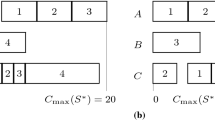Abstract
This paper addresses the problem of open shop scheduling on two machines with resources constraints. In the context of our study, in order to be executed, a job requires first, for its preparation for a given period of time, a number of resources which cannot exceed a given resource capacity. Then, it goes onto its execution while the resources allocated to it become available again. We seek a schedule that minimizes the makespan. We first prove the \(\mathcal{N}\mathcal{P}\)-hardness of several versions of this problem. Then, we present a well solvable case, lower bounds, and heuristic algorithms along with an experimental study.











Similar content being viewed by others
References
Angelelli, E., & Filippi, C. (2011). On the complexity of interval scheduling with a resource constraint. Theoretical Computer Science, 412, 3650–3657.
Blazewicz, J. (1987). Selected topics in scheduling theory. Annals of Discrete Mathematics, 31, 1–61.
Blazewicz, J., Lenstra, J. K., & Rinnooy Kan, A. H. G. (1983). Scheduling subject to resource constraints: classification and complexity. Discrete Applied Mathematics, 5, 11–24.
Blazewicz, J., Cellary, W., Slowinski, R., & Weglarz, J. (1986). Scheduling under resource constraints—deterministic models. Annals of Operations Research, 7.
Brucker, P., Drexl, A., Moehring, R., Neumann, K., & Pesch, E. (1999). Resource-constrained project scheduling: notation, classification, models, and methods. European Journal of Operational Research, 112, 3–41.
Cheng, T. C. E., Wang, G., & Sriskandarajah, C. (1999). One-operator two-machine flow-shop scheduling with setup and dismounting times. Computers & Operations Research, 26, 715–730.
De Werra, D., & Blazewicz, J. (1992). Some preemptive open shop scheduling problems with a renewable or a nonrenewable resource. Discrete Applied Mathematics, 35, 205–219.
De Werra, D., & Blazewicz, J. (1993). Addendum: some preemptive open shop scheduling problems with a renewable or a non renewable resource. Discrete Applied Mathematics, 43(1), 103–104.
De Werra, D., Blazewicz, J., & Kubiak, W. (1991). A preemptive open shop scheduling problem with one resource. Operations Research Letters, 10, 9–15.
Figielska, E. (2008). A new heuristic for scheduling the two-stage flowshop with additional resources. Computers & Industrial Engineering, 54, 750–763.
Figielska, E. (2010). Heuristic algorithms for preemptive scheduling in a two-stage hybrid flowshop with additional renewable resources at each stage. Computers & Industrial Engineering, 59, 509–519.
Garey, M. R., & Johnson, D. S. (1979). Computers and intractability: a guide to the theory of NP-completeness. New York: W.H. Freeman.
Glass, C. A., Shafransky, Y. M., & Strusevich, V. A. (2000). Scheduling for parallel dedicated machines with a single server. Naval Research Logistics, 47, 304–328.
Gonzalez, T., & Sahni, S. (1976). Open shop scheduling to minimize finish time. Journal of the ACM, 23(4), 665–679.
Graham, R. L., Lawler, E. L., Lenstra, J. K., & Rinnooy Kan, A. H. G. (1979). Optimization and approximation in deterministic sequencing and scheduling: a survey. Annals of Discrete Mathematics, 5, 287–326.
Hall, N. G., Potts, C. N., & Sriskandarajah, C. (1994). Parallel machine scheduling with a common server. Working Paper Series WP 94-21, Max M. Fisher College of Business, The Ohio State University, Columbus, OH.
Jurisch, B., & Kubiak, W. (1997). Two-machine open shops with renewable resources. Operations Research, 45, 544–552.
Kellerer, H., & Strusevich, V. A. (2003). Scheduling parallel dedicated machines under a single non-shared resource. European Journal of Operational Research, 147, 345–364.
Kellerer, H., & Strusevich, V. A. (2004). Scheduling problems for parallel dedicated machines under multiple resource constraints. Discrete Applied Mathematics, 133, 45–68.
Lenstra, J. K., & Rinnooy Kan, A. H. G. (1984). New directions in scheduling theory. Operations Research Letters, 2(6), 255–259.
Pinedo, M., & Schrage, L. (1982). Stochastic shop scheduling: a survey. In M. A. H. Dempster, E. H. Lawler, J. K. Lenstra, & A. H. G. Rinnooy Kan (Eds.), Deterministic and stochastic scheduling (pp. 181–196). Dordrecht: Reidel.
Tautenhahn, T., & Woeginger, G. J. (1997). Unit-time scheduling problems with time dependent resources. Journal of Computing, 58(2), 97–111.
Acknowledgements
This research is funded for Djamal Rebaine by the Natural Sciences and Engineering Research Council of Canada (NSERC).
Author information
Authors and Affiliations
Corresponding author
Rights and permissions
About this article
Cite this article
Oulamara, A., Rebaine, D. & Serairi, M. Scheduling the two-machine open shop problem under resource constraints for setting the jobs. Ann Oper Res 211, 333–356 (2013). https://doi.org/10.1007/s10479-013-1446-9
Published:
Issue Date:
DOI: https://doi.org/10.1007/s10479-013-1446-9




